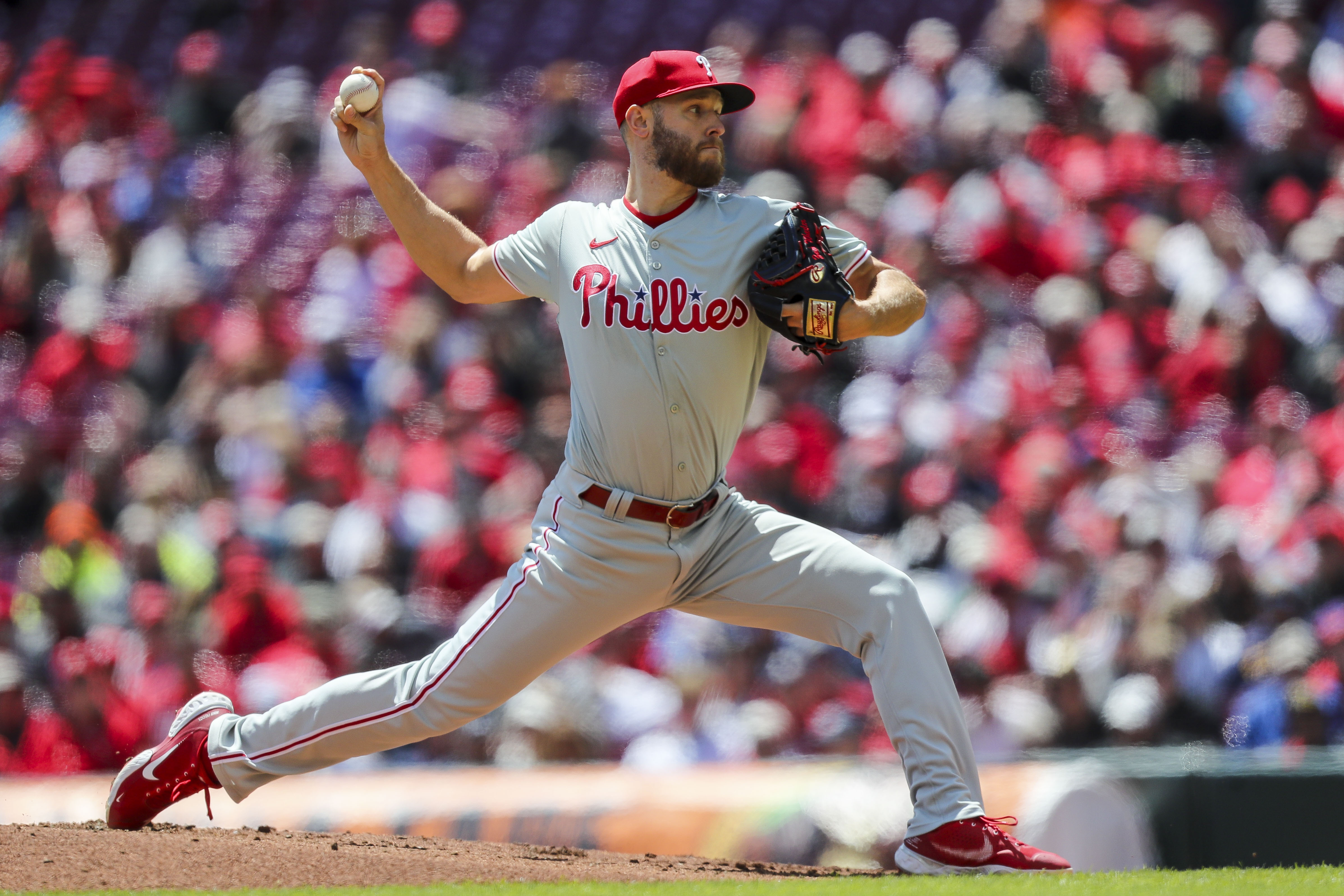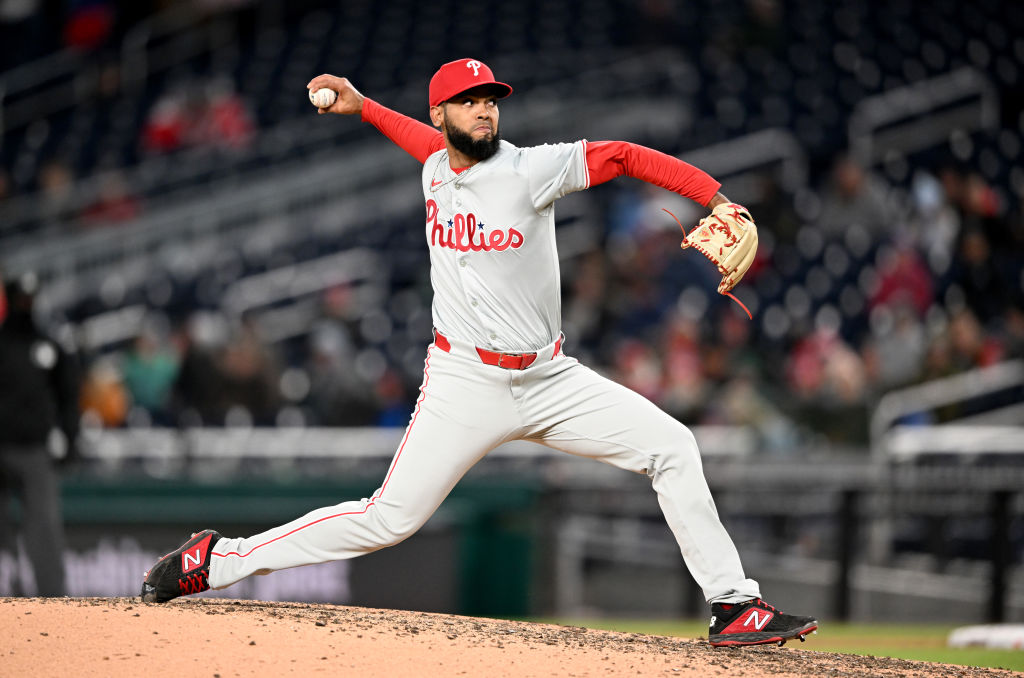One of the lasting impressions from Phillies spring training was that the organization is in pretty good shape at second base.
Scott Kingery was the star of the first two weeks of Grapefruit League play. He made eye-popping plays in the field and hit .286 with a .400 on-base percentage and a .619 slugging percentage in 25 plate appearances. Before sending Kingery over to the minor-league side, manager Pete Mackanin said, "It looks like he's on a fast track to the major leagues." Kingery is off to a great start at Double A Reading with three doubles, four homers and 12 RBIs in his first 32 at-bats.
After Kingery left, Jesmuel Valentin stepped up during the final two weeks of camp. He hit .366 with a .422 on-base percentage and a .512 slugging percentage in 45 plate appearances and was the last cut from the 25-man roster. Valentin opened the season at Triple A Lehigh Valley with 11 hits, five RBIs and a .412 on-base percentage in his first 10 games.
Kingery turns 23 later this month. Valentin turns 23 in May. The general consensus is that Kingery is the Phillies' second baseman of the future, but Valentin will have something to say about that.
And so will a young man named Cesar Hernandez.
Sometimes it's easy to forget that the Phillies' current second baseman is still quite young; he will turn 27 on May 23. And given his age and rate of improvement -- he's one of the most improved players in baseball since last June -- he just might be the Phillies' second baseman not only of the present but of the future, as well.
Philadelphia Phillies
Complete coverage of the Fightin' Phils and their MLB rivals from NBC Sports Philadelphia.
For Hernandez, there is no "might" about it.
"Me," he said the other day, jabbing himself in the chest when asked who the Phillies' second baseman of the future is.
"I want to be a Phillie for life.
***
It almost seems as if Hernandez has been a Phillie for life. He signed with the club in the summer of 2006, the same day the team signed another teenage infielder from Venezuela -- Freddy Galvis. Hernandez and Galvis are now in their third season as the Phillies' full-time double-play combination, but their relationship goes back a lot farther than that.
They first started playing against each other in national tournaments in Venezuela -- Hernandez is from the state of Carabobo, Galvis from Falcon -- when they were 12 and hosted each other in their family homes over the course of four summers for a week each time.
Any pillow fights?
"No," Hernandez said with a laugh. "We were too tired from being at the field, playing and practicing all day."
As kids, both players were shortstops. Hernandez recalled running into Galvis at a Phillies' tryout camp, but did not know his friend had signed with the Phillies until the day after he put his own name on a contract. Hernandez received a $49,000 bonus to sign with the Phillies. Galvis got $90,000. In 2017, Hernandez will make $2.55 million and Galvis $4.35 million.
Hernandez described his relationship with Galvis as "brotherly." That benefits them on the field.
"We can get a message across in a few words or just with our body language or with a look," Hernandez said. "It's a very close relationship.
"It's incredible how things turned out to be. We met as kids and now we're playing together. It's incredible."
***
There was a time last season when Hernandez and Galvis did not play together.
Hernandez was hitting .249 with a .239 on-base percentage and driving Mackanin crazy with boneheaded base-running plays, wild swings and an inability to get on base when he was benched on June 21. Hernandez sat for two games and would have sat for more had he not been needed when Tommy Joseph needed a day. Hernandez got back in the lineup had four hits and a walk and was a different player the rest of the season.
After the benching until season's end, Hernandez hit .327 (13th-best in the majors over that span) with a .421 on-base percentage (fifth-best).
"Tough love," Mackanin said. "The benching was sort of the last piece of the puzzle. Enough was enough. He should be better. It was a proverbial slap in the face. But he took off from there. Hate me now, love me later."
Hernandez has admitted the benching shook him and got him to focus on the player the Phillies want him to be -- a line drive hitter who works counts and gets on base.
Hernandez has continued his ascension this season. He has been the Phillies' best player, hitting .346 with three doubles, a triple, three homers, a .393 on-base percentage and a majors-high 13 runs scored through Sunday.
Over the winter, Hernandez got in the weight room and added 15 pounds of muscle to his 5-10 frame. He is now 180 pounds and strong. He is hitting the ball harder. He has twice led off games this season with homers and hit a decisive two-run shot to break a 2-2 tie in the eighth inning and give the Phillies a 4-2 win in Washington on Saturday afternoon.
After that game, Mackanin commented that Hernandez had "turned into a really good major league player."
Those words would never have come out of Mackanin's mouth when he benched Hernandez last June.
When told of Mackanin's comment, Hernandez smiled.
"It makes me very happy to hear that," he said with the help of Diego Ettedgui, the Phillies' Spanish language translator. "That's what it's all about. You want to see your work pay off. The sacrifices that I've made are taking me places. If the results are showing that makes me happy. It is what I've worked for."
And there's no question Hernandez has worked. It shows not only in his body, but in the time he puts in with hitting coach Matt Stairs. Hernandez is a dedicated student.
"He's a very sound hitter," Stairs said. "He's the most underrated guy on the team right now. If he has a bad at-bat he comes and asks questions. He wants to learn.
"He does all his work in the cage. But he keeps it simple and that's what a good fastball hitter should do. From what I've seen, he's just become a more focused player.
"He's a tremendous player."
***
Focus. Work ethic. Confidence.
Whatever the reason for Hernandez' improvement, one has to wonder what role internal competition has played in it. Kingery and Valentin both had good seasons and began to gain buzz last year. They shared a clubhouse with Hernandez in spring training this year and Hernandez witnessed their abilities up close. He knows they are not far away. He knows some folks believe Kingery is the team's future at second base and he could become a trade chip. Heck, according to multiple sources, the Phillies received inquiries about Hernandez this past offseason and didn't exactly respond by saying he was an untouchable. It was more like the team put a high price tag on him because it sees what everyone else sees: A good young player who is getting better.
Hernandez was asked if Kingery and Valentin have given him a healthy push.
"Not really," he said. "That doesn't motivate me. I live day by day and focus on my own stuff.
"I want to get better and help my team get better. I don't pay attention to what the minor leaguers are doing. I know there is talent there, but I have to focus on myself."
However you dissect it -- whether Hernandez is the present and future at second or whether he's cashed in for value on the trade market -- the Phillies are in pretty good shape at second base.
"We're fortunate to have guys like Kingery and Valentin, but at the same time we like the guy we have here a lot," Mackanin said. "I feel like you can win with this guy. It's a nice spot to be in."



